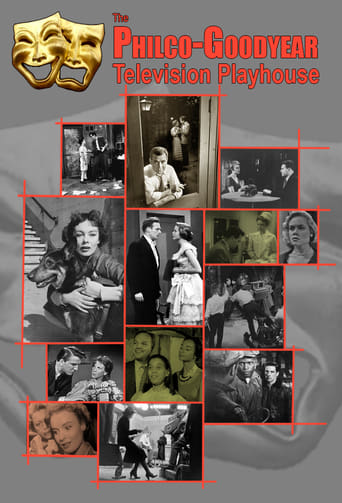F Gwynplaine MacIntyre
'Philco Television Playhouse' was one of the earliest anthology series from tv's Golden Age. Although this series had much lower production values than what was on offer in more prestigious anthologies such as 'Playhouse 90', the Philco series nonetheless featured some of the best actors, scripters and directors in the industry at that time. Grace Kelly starred in several episodes. James Dean starred in the last episode of the sixth season, almost exactly a year before his death.'Philco Television Playhouse' was transmitted live fortnightly, alternating in its time slot with 'Goodyear Television Playhouse': effectively the same series with a different sponsor. Several episodes of 'Philco' were based on public-domain works by authors including Shakespeare, Jane Austen and Nathaniel Hawthorne ... but many episodes featured original dramas written especially for this series. All of the episodes were performed on soundstages, so the series favoured stories that took place entirely indoors, on minimal sets.The episode broadcast 6 February 1955 was 'A Sense of Justice', an original drama scripted by Gore Vidal. Character actor E.G. Marshall stars as Dennis Leighton, a corrupt businessman in a modern-day Western town with the peculiar name Talisman. Leighton is backing Harris Rhodes (Frank Overton) to campaign for Congress. Rhodes was a good man once, but he is now corrupted by Leighton; if Rhodes gets elected, he'll be Leighton's cat's-paw in Congress.Arriving from the East is Peter Chase (John Hudson), a former Army buddy of Rhodes. Chase has never met Leighton, but he has come to Talisman specifically to murder him. Chase was an idealist who became embittered after a road accident (he sustained minor injuries, but his wife was killed). Chase blaimes Leighton for Rhodes's fall from grace, and feels that he must serve justice by shooting Leighton.This is an earnest drama with some good dialogue, but it suffers from the technical problems of live tv in 1955. The climactic scene is a long thick-ear dialogue in which Chase and Leighton sit in front of a static camera while Chase explains why he's going to murder Leighton. (Instead of just squeezing the trigger, he talks about it at great length.) It's a dull scene with little action, but I recognise that the huge lumbering orthicon cameras of this period required actors to stay in one spot for long periods.SPOILERS COMING. During the long confrontation between Chase and Leighton, actor E.G. Marshall's hands are concealed by the tabletop. At the end of the scene, we discover that he's wearing handcuffs: the authorities got to Leighton first, so Chase won't have to kill him after all. I found this hidden-handcuff business a cheap gimmick. Gore Vidal claimed that this business was inserted by director Robert Mulligan, which may indeed be the case.The entire cast of 'A Sense of Justice' give good performances, notably Paul Tripp as a newspaper editor whose house is torched by Leighton's goons. Tripp (an underrated character actor, best known for his work in children's series) gives a touching performance as a man who has lost his home and all his property, yet seems most concerned that his three Siamese cats were killed in the blaze.
Lou Rugani
As we enter Y2K, it's good to look back on such terrific programs as The Philco Television Playhouse (so named for a time when one sponsor would pick up the whole tab for the series), when the production people strove for excellence, to do the very best they could on the air for their audience, and when actual thought and attention to the on-screen activities was mandatory. (It was for programs such as this that the "TV Dinner" was created, for better or worse. But at least there was something then to attract our continuous attention.) Philco Television Playhouse and the other anthologies of the day were very, very good television, indeed.
